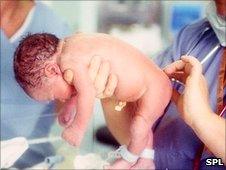Should there be a limit on Caesareans?
- Published

One in four babies is delivered by Caesarean section in Britain
The World Health Organization has dropped its recommendation that fewer births be carried out by Caesarean section, saying there was no evidence for a limit.
The WHO had previously advised that no more than 10 to 15% of babies be delivered by section, a figure often cited by those concerned about rates in the UK - where one in four babies comes into the world in this way.
But now the WHO states that "there is no empirical evidence for an optimum percentage" and stresses that "what matters most is that all women who need Caesarean sections receive them".
Yet in the NHS, doctors, hospitals and midwives have been under pressure to persuade women to give birth naturally. So should there be less pressure on women to avoid surgical intervention?
Despite the popular perception of mothers who are "too posh to push", more than half of the C-sections carried out in the UK are done as emergencies.
These are carried out when labour has started normally but complications arise.
The current tally - 25% of births - is thought to be a result of the number of obese and older women having complicated births, although there are many other factors at work too.
Slight risks
Although the national average is one in four, Caesarean rates vary widely across the country.
In some areas of London, the rate is highest at 33%, whereas in one area of the Midlands it is as low as 15%, which is in line with the WHO's now withdrawn target.
Janet Fyle, from the Royal College of Midwives, said she believed the WHO's original target was right, although nobody had kept to it.
"If a woman has a normal birth her outcomes and her chances of recovery are much better than someone who has gone through a major operation like a Caesarean."
The surgical procedure means that both mothers and babies face slight risks, although often these risks are outweighed by the problems of proceeding with a natural birth.
Experts point to an increased risk of respiratory problems for the baby, higher risk of bleeding for the mother and a longer stay in hospital to recover as reasons why natural births are the preferred option.
But a vaginal birth also carries risks. The woman could tear badly, the baby could be damaged if forceps or vacuum extraction is used, and there is an increased risk of pelvic organ prolapse after delivery.
'Trial of labour'
Pauline McDonagh Hull of electivecaesarean.com, a website on birthing choices, said women were not being told in ante-natal classes how many vaginal deliveries run into problems.
"Women are made to feel that a normal birth is more important than the baby. We shouldn't be forced to go through a trial of labour if we don't want to. Reducing rates at all costs isn't right," she said.
Professor James Walker, consultant obstetrician at St James's University Hospital in Leeds and spokesman for the Royal College of Obstetricians and Gynaecologists, says targets are not helpful for Caesareans.
"If you set a target then people focus on that target. What we should be doing is giving optimal care to the mother. That way we minimise the reasons for a section.
"Having a Caesarean section is a reasonable option, but it's about the appropriate treatment for the appropriate people," he said.
Health professionals are regularly heard to say that giving birth is an unpredictable business. The key issue for many is having the right professionals around who understand pregnancy and birth so that women can be helped through their labour experience.
'Normal birth'
In situations where a woman experiences complications in labour, says Maggie Blott, consultant obstetrician at University College Hospital in London, a Caesarean should be carried out for the right reasons.
"My job is not to perform Caesareans, it's to prevent them happening.
"To help this process decision-making must be correct at a senior level and consultants should be available on labour wards all the time to advise," she said.
The RCM's Janet Fyle said: "There are many reasons to deliver babies by planned or emergency Caesarean, but we should be doing all we can to support women to have a normal birth, where possible."
Having a good mix of staff on the labour wards, including senior midwives and consultants, is seen as key to keeping Caesarean rates down.
"But the most important thing is that mother and baby are well. Childbirth is a marathon, and everyone crosses the finishing line with a baby, however they get there," says Caroline Overton, a consultant at St Michaels University Hospital in Bristol.
"Of course we need to explore why women request Caesareans and see if we can encourage them to have a natural birth, but it is very important mothers feel they have options."
The National Institute for Health and Clinical Excellence is currently in the process of updating its clinical guidelines on Caesarean section, although it does not expect to publish these until the end of next year.